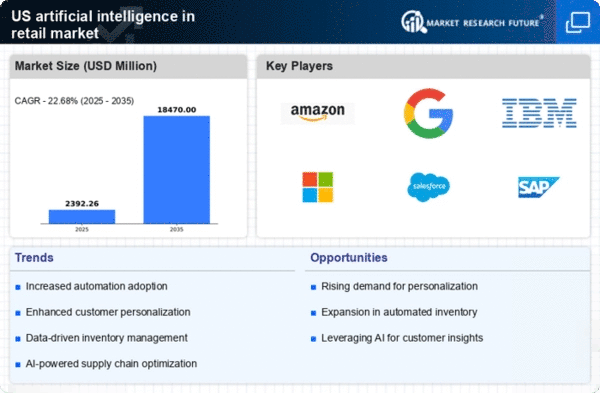Enhanced Fraud Detection
Enhanced fraud detection capabilities represent a crucial driver in the artificial intelligence-in-retail market. Retailers are employing AI algorithms to identify and mitigate fraudulent activities, which can lead to substantial financial losses. In 2025, it is anticipated that AI-driven fraud detection systems will help reduce fraud-related losses by approximately 25% in the retail sector. By analyzing transaction patterns and customer behavior, AI can flag suspicious activities in real-time, allowing retailers to take immediate action. This proactive approach not only safeguards revenue but also builds consumer trust, which is essential for long-term success in the competitive retail landscape.
Automation of Routine Tasks
The automation of routine tasks is a pivotal driver in the artificial intelligence-in-retail market. Retailers are increasingly adopting AI solutions to automate processes such as inventory tracking, order fulfillment, and customer inquiries. This trend is projected to reduce operational costs by up to 30% by 2026, as businesses can allocate resources more efficiently. Automation not only enhances productivity but also allows employees to focus on higher-value tasks, such as customer engagement and strategic planning. As AI technologies continue to evolve, the potential for further automation in retail operations appears promising, leading to improved service delivery and customer satisfaction.
Data-Driven Decision Making
The artificial intelligence-in-retail market is increasingly driven by the need for data-driven decision making. Retailers are leveraging AI technologies to analyze vast amounts of consumer data, enabling them to make informed choices regarding inventory management, pricing strategies, and marketing campaigns. In 2025, it is estimated that 70% of retailers in the US will utilize AI analytics to enhance operational efficiency. This shift towards data-centric approaches allows businesses to respond swiftly to market trends and consumer preferences, thereby improving their competitive edge. The integration of AI in data analysis not only streamlines operations but also fosters a culture of continuous improvement within the retail sector.
Personalized Marketing Strategies
Personalized marketing strategies are emerging as a key driver in the artificial intelligence-in-retail market. Retailers are increasingly utilizing AI to analyze consumer behavior and preferences, allowing them to tailor marketing efforts to individual customers. This approach is projected to increase customer engagement rates by 15% in 2025, as personalized experiences resonate more with consumers. By leveraging AI-driven insights, retailers can create targeted promotions and recommendations that enhance the shopping experience. This shift towards personalization not only boosts sales but also fosters brand loyalty, as customers are more likely to return to retailers that understand their unique needs.
Improved Supply Chain Transparency
Improved supply chain transparency is becoming increasingly vital in the artificial intelligence-in-retail market. Retailers are utilizing AI technologies to gain real-time insights into their supply chains, enabling them to track products from manufacturers to consumers. This transparency is expected to enhance operational efficiency and reduce delays, with studies indicating that AI can improve supply chain performance by up to 20%. By leveraging AI for predictive analytics, retailers can anticipate demand fluctuations and optimize inventory levels, ultimately leading to better customer satisfaction and reduced waste. The focus on transparency is likely to reshape how retailers manage their supply chains in the coming years.
















